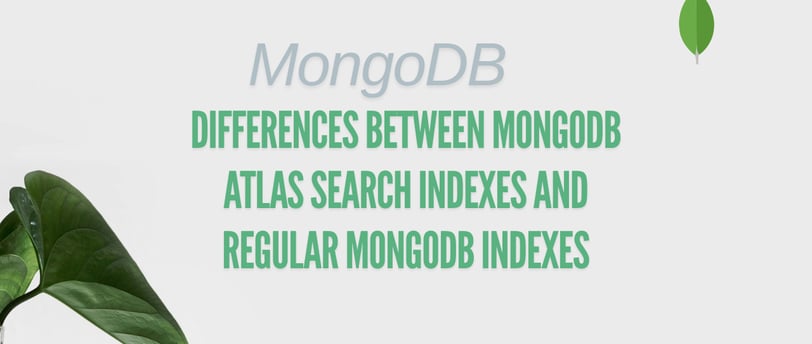Differences Between MongoDB Atlas Search Indexes and Regular MongoDB Indexes
Explore the key differences between MongoDB Atlas Search indexes and regular MongoDB indexes, including their design, purpose, and capabilities for optimizing query performance and handling complex text searches.


Learn more about mongodb atlas search
MongoDB Atlas Search indexes differ from regular MongoDB indexes in several key ways, particularly in their design, purpose, and capabilities. Here are the primary differences:
Purpose and Design
Atlas Search Indexes:
Purpose: Specifically designed for full-text search capabilities, allowing for complex search queries over text data, including features like relevance scoring, faceting, highlighting, and synonym matching.
Design: Built on top of the Apache Lucene search library, which is optimized for full-text search and provides a wide range of text analysis features.
Capabilities: Can handle text analysis, tokenization, stemming, and other advanced text processing techniques. Supports compound queries and multiple types of searches (e.g., text, range, geo-search).
Regular MongoDB Indexes:
Purpose: Designed to optimize query performance for various types of queries in MongoDB, including equality, range, and sorting queries.
Design: B-tree based structure, optimized for general-purpose querying and not specifically for full-text search.
Capabilities: Supports equality queries, range queries, sorting, and partial indexes. Does not provide advanced text analysis features available in Atlas Search indexes.
Indexing Process
Atlas Search Indexes:
Text Analysis: Uses analyzers to process text data before indexing. Analyzers can include tokenizers, character filters, and token filters to handle complex text transformations.
Field Mappings: Require explicit field mappings that define how each field in a document should be indexed and searched. Supports dynamic and static mappings.
Data Types: Can index a wide variety of data types including text, numbers, dates, booleans, and arrays, with specific indexing techniques for each.
Regular MongoDB Indexes:
Text Analysis: Does not perform advanced text analysis. Text indexes support simple tokenization but lack the complexity of Lucene-based analyzers.
Field Mappings: Indexes are created on specific fields or compound fields without the need for complex mappings.
Data Types: Primarily focused on indexing basic data types (strings, numbers, dates, etc.) for equality and range queries.
Querying Capabilities
Atlas Search Indexes:
Full-Text Search: Provides powerful full-text search capabilities with relevance scoring, highlighting, and facet searching.
Compound Queries: Allows for complex query combinations using logical operators (must, should, mustNot).
Search Stages: Uses the $search stage in the aggregation pipeline to perform various types of search queries.
Advanced Features: Supports autocomplete, synonyms, proximity searches, and more.
Regular MongoDB Indexes:
Basic Query Support: Optimizes equality, range, and sort queries but does not provide advanced full-text search features.
Simple Queries: Uses traditional query operators ($eq, $gt, $lt, $in, etc.) to match indexed fields.
Aggregation Framework: Can be used in conjunction with the aggregation framework but lacks the specialized $search stage.
Performance and Scalability
Atlas Search Indexes:
Search Optimization: Optimized for search queries, providing fast retrieval of relevant documents based on text search criteria.
Resource Usage: May require additional resources for text analysis and indexing, particularly for large text fields and complex analyzers.
Regular MongoDB Indexes:
Query Optimization: Optimized for general query performance, reducing query execution time for indexed fields.
Resource Usage: Generally lightweight and optimized for a wide range of query types, but not specifically for full-text search.
Examples
Creating an Atlas Search Index:
Creating a Regular MongoDB Index:
Performing a Search Query with Atlas Search:
Performing a Query with Regular MongoDB Indexes:
In summary, MongoDB Atlas Search indexes are tailored for full-text search scenarios, leveraging advanced text analysis and search capabilities, while regular MongoDB indexes are designed for general query optimization across various query types.
Discover
Blogs to enhance your knowledge and curiosity.
Explore
Learn
info@learnerbuzz.com
© 2024. All rights reserved.
Terms & Conditions
